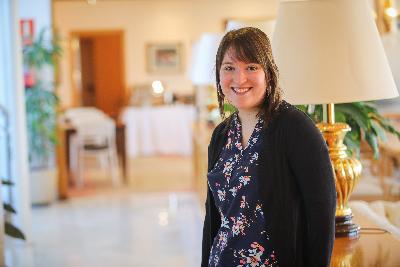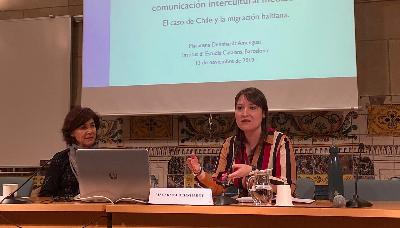Collective residencies / DIVERSITY POLICIES / Olot
MACARENA DEHNHARDT
From Monday, 11 November 2019 to Friday, 22 November 2019
Bio
Macarena Dehnhardt is a Chilean PhD student in the program of Translation and Intercultural Studies, taught by the Universitat Autònoma de Barcelona (UAB).
In Chile, she obtained the bachelor’s degree in Hispanic Literature and Linguistic by the Universidad de Chile. Afterward, she fulfilled a master’s degree in the UAB. During the master, she began her research in the communication between the Chilean public services and the Haitians immigrants that arrived in Chile. For this purpose, the object of study was approached by the areas of Public Services Interpreting and Translation Policies.
At present, Dehnhardt is developing a deeper research about this topic in her PhD thesis, funded by a scholarship provided by the Chilean government. The aim is to analyze the Translation Policies that the Chilean public institutions have taken to overcome language barriers with Haitians and how these policies are embodied in different initiatives in the healthcare and educational domains.
Project
During my stay at Faber, I will explore the following research question: How the Chilean public institutions in the domains of healthcare and education overcome the language barriers that emerge in the communication with Haitian immigrants?
On the one hand, this question will allow me to analyze policies related to the migration in the country, considering linguistic issues and, on the other hand, it will let me describe specific initiatives taken by different public centers to communicate with Haitians, such as community interpreters and Spanish classes.
The ultimate purpose of this analysis is to write an article that can be published in a specialized journal.
The experience of diversity in Faber.
I have always thought that researching about diversity policies and, specifically, about migration and language requires a real involvement with these kinds of experiences. For example, being an immigrant in other country –even if it is for a few weeks or months–, talking with people who came from abroad to the place you are living in, paying attention to the ways in which people with different cultures deal with integration in the local culture, and so on. In consequence, when I came to Faber Residence, I was wondering how I could research and discuss about diversity policies with my colleagues trying, at the same time, to have a real connection with these topics. And it turned out that the whole Faber and Olot experience was perfect to get immerse in a context of diversity, migration and multilingualism. The fact that we were in a thematic residence and also that people from all over the world came to this activity made it more enriching, because we had to use a lingua franca (sometimes English and sometimes Spanish) between all the residents, we exchange opinions from the different fields of research and work in which we are developing and we all had different experiences and views about diversity.
Moreover, staying in Olot was, for me, an experience of diversity: I saw people from diverse countries, religions, cultures and languages (like the sijs’s procession in one of the main streets). Furthermore, I could feel the identity of the host society that use Catalan as the main language of communication in different places, including local museums.
The whole context made me think about how we can understand and live in a diverse society, considering cultures and languages. I am really thankful with Faber and Linguapax for giving me the opportunity to discover new points of view of people from all over the world (India, Canada, USA, Brasil and Chile) and for giving me the chance to share my research, during my stay in Olot.
Regarding my days in Faber Residence located in Riu Fluvià Hotel, all the staff made me feel really comfortable, which was an ideal scenario to focus on my work and to pursue my objectives in here. On the other hand, the team of Faber (Gavina, Pepa and Pau) were kind and opened to help us with everything. I am also thankful for the tour by La Garrotxa, leaded by Pepa and Gavina, who showed us places as Besalú, Argelaguer and Castellfollit. For me, the art of Garrell was really remarkable, because it was a different approach to architecture and to the ways in which we understand art.
In conclusion, I think Faber and, particularly, this thematic residence was perfect to broaden my knowledge and experience about diversity, migration and languages, and to think about new topics to research in my hometown.


